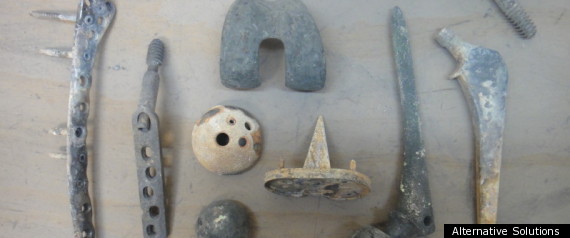
That old saying when a person dies, "Ashes to ashes, dust to dust," doesn't quite work if they have artificial hips, knees or dental prosthetics.
Fact is, those metal implants can't be cremated and if they are buried in the ground, they could pose environmental hazards.
In recent years, some for-profit businesses have sprung up to recycle the leftover implants by taking the metal from crematories, melting it down and selling it, but the San Diego Union-Tribune reports that crematories are often reluctant to work with them, wanting to avoid any appearance of cashing in on the implants.
Admittedly, the idea of someone making a killing off of Aunt Mabel's artificial hip is a tad distasteful, but San Diego-based entrepreneur Ray Saadeh is taking a new approach.
Saadeh, 40, has created Alternative Solutions, a non-profit that takes the leftover implants from the crematories, shreds and cuts the metal into pieces that can be melted down and sold to companies that can take the metal and turn it into things like airplane parts or even new implants.
The money is then donated to a charity of the crematory's choice.
"Crematories want to recycle, but they want a non-profit solution," Saadeh told AOL Weird News. "This is metal that must be destroyed. It can't be reused by someone else and it does not decompose."
In 1997, Saadeh's wife, Julia, died from a brain tumor and was cremated.
Saadeh read an article in 2008 about how funeral homes and crematories need to recycle metals due to environmental concerns. Although Julia had had no implants, he was inspired to create the charity in her memory.
He saw it as a way to give back.
"I was born in Bethlehem and I moved here 20 years ago and want to give back to this country," he said.

Currently, 45 crematories from across the nation are participating. Many days, a FedEx truck pulls up to Saadeh's office in Spring Valley, California, to drop off a ten-gallon drum containing implants that were previously inside of people.
Saadeh provides the barrels to the crematories and collects the implants at no cost. He also pays for all shipping.
He then sells the metal to a recycler in Los Angeles. Depending on how much metal a drum contains, he can make between $50 and $700 per drum, which, after administrative costs, is donated to charity. He generally turns over about 60 percent of the money to the American Red Cross, the Unforgettables Foundation, and other groups.
"I want to stress that crematories don't pay for the service," he said. "Generally, they will release the metals to for-profit companies that may or may not donate money to charity."
In its first full year of operation, Alternative Solutions and the 45 participating crematories donated $45,000 to charity. Now 160 crematories are participating, and as words spreads about the organization, Saadeh hopes to raise $2 million by the end of 2011.
The Cremation Association of North America estimates that by 2020, cremations will exceed burials. Saving the metals from burial helps the environment and provides a type of reincarnation for the implants.
"These metals have a useful second life," said Tom Snyder, a vice president with Stewart Enterprises of New Orleans, which owns 400 funeral homes, crematories and related businesses. "Quite frankly, burying them is not very environmentally friendly and provides no benefits to anyone."
Alternative Solutions is getting support from the death industry, especially those who specialize in Earth-friendly burials such as Oregon-based mortician Elizabeth Fournier, who is known as the "Green Reaper."
"I love it. I find him savvy, ecofresh and fun!" she said, but adds she'd like to give the power of donation to the families of the deceased. "I would love an easy-peasy funeral donation process where all funeral homes of a standard form families can sign along with the state mandatory Cremation Authorization. They could peruse the list and check the box of which charity would receive their loved one's remnants. My brain is already going to Harvard for research, and the idea of the Harrington rod and screws in my husband's back going to the Veterans of Foreign Wars tickles me."
Saadeh has other plans as well. He'd like to add a disclosure notice to all cremation contracts that explains that materials will be recycled. He'd also like to extend the recycling to people buried in the traditional way as well.
"This is already happening in Europe," he said.
But while Fournier is thrilled with Saadeh's concept, she says that there are other ways to recycle implants besides melting them down for resale.
"You would be amazed at the amount of people that never knew they really wanted that metal plate back from Brother Bob's head," she said. "Take the tiny screws I had one decedent swallow back in high school as a dare. Yep. His kids wanted them back because they didn't believe he actually did it.
"Then there was the little old lady who made wind chimes out of the titanium hip replacement pieces in all her friends bodies. She gingerly asked the friend who was soon to be crossing over if this was cool, and then they were sure to let their kids know their post-mortem parts were to be presented to her.
"She now keeps the memory of those friends alive through the songs of their bones. Well, sustainable bones."
